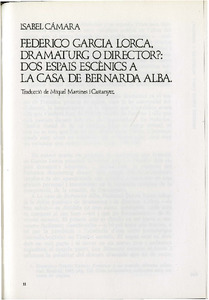| dc.description.abstract | <p>In his book <em>Federico y su mundo, </em>Francisco García Lorca contends that the stage in his brother's plays “ ... opens up not only towards the spectator but towards an afterlife surrounding the stage”. Relying on her clase study of <em>La casa de Bernarda Alba, </em>Isabel Cámara seeks to show that this hypothesis is accurate and easily proven. In this particular tragedy, Lorca exchanges the stage direction Enter/ Exit in such a way that “Exit” acquires a double meaning: the one that conventionally corresponds to it and also its opposite. Concerning Poncia, Bernarda and Adela “Exit” not only signifies to disappear from the public's sight, but it also announces the “Exit” from backstage to the public stage. The confusion of the stage directions is in direct relation to the tragic tension of the drama, so that the confusion raises two phenomena; the union of the two dramatic spaces, stage and backstage, and the intense presence of the playwright/”director” in the climactic moment of the tragedy. The true protagonist turns out to be the stage and the dramatic space off-stage ar “outside”. At the end of the tragedy, the true protagonist turns out to be the stage and the decor of the initial scene through two of the main characters. It should be recalled that when the curtain rises, the stage is empty and silent. After Adela commits suicide, an event which takes place backstage, Poncia commands to Bernarda, “Don't Enter!”, and the final word of the drama, uttered by Bernarda, is “Silence!”. This inevitably recalls the space and silence which initiate the play. </p>
<p>Cámara maintains that <em>La casa de Bernarda Alba </em>is unique among the plays of Lorca because the author has deliberately exchanged the signs of the stage directions, with the intention of offering the public a “mise en crise” of the conventional psychic and physical spaces on stage.</p> | |


